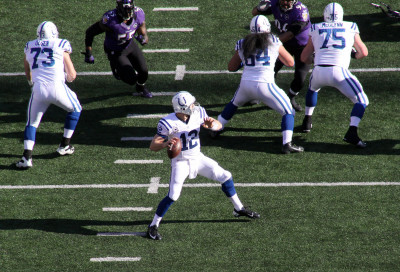
This past Sunday at Lucas Oil Stadium in Indianapolis, the New England Patriots and the Indianapolis Colts squared off in a rematch of the 2014 AFC Championship.
Since taking over for Drew Bledsoe in the fall of 2001, Tom Brady has faced off against the Colts 18 times. In 13 regular season matchups and five playoff games, Brady is an astonishing 14-4 against Indianapolis.
Many believe that the former University of Michigan quarterback’s rival is not the Colts themselves but rather their former quarterback, Peyton Manning. However, this January, Indianapolis reinvigorated the rivalry by spearheading Deflategate, the alleged cheating scandal that hung around the Patriots’ offseason like the smell of cheap cologne.
But considering the Patriots’ recent beat-downs of quarterback Andrew Luck and company, are New England and Indianapolis really rivals?
In his first start as an NFL quarterback, Brady, a sixth-round pick in the 2000 Draft, faced off against Manning, a former No. 1 overall pick out of the University of Tennessee. That 44-13 thrashing of the then-undefeated Colts on a crisp fall day in Foxborough would set the tone for the next 15 years of back-and-forth high stakes, high emotions and chess matches between the two perennial AFC powerhouses.
The rivalry was full of drama in its early stages, as exemplified by the Patriots’ 38-34 victory over Indianapolis on Nov. 30, 2003 at the RCA Dome. Taking the ball at midfield with 2:57 to go, Manning drove the Colts down to the New England two-yard line with a chance to win the game.
However, in a play that forever lives in New England football lore, the Patriots defense held strong and on four occasions prevented Manning and running back Edgerrin James from crossing the goal line. Their defensive stand has been memorialized by the image of linebacker Willie McGinest tackling James on the Patriots’ one-yard line and subsequently sprinting to midfield in a euphoric celebration.
Later that season, in the 2003 AFC Championship game, the first of three between the two squads under the Brady and Bill Belichick regime, Brady once again outdid his counterpart by going 22-for-37 on pass attempts with 237 yards and a touchdown.
Shortly following New England’s 24-14 victory over Manning and the Colts on that snowy evening, the Patriots would go on to win the second of their three Super Bowls in the early 2000’s. Brady and company would also best Indianapolis again the next year, this time by a score of 20-3 in the divisional round, en route to back-to-back Super Bowl crowns.
However, the rivalry was not completely one-sided, as Manning would finally grind his way past Brady and the Patriots in the 2007 AFC Championship game. In arguably the best of the AFC Championships between the two franchises, Manning and Brady dueled in a long-awaited shootout between the two best quarterbacks of their generation.
Leading 21-6 at halftime, the Patriots offense watched as Manning, wide receiver Marvin Harrison and running back Joseph Addai orchestrated a 32-point second half, taking a 38-34 lead with one minute left in the game. On the ensuing Patriots possession, defensive back Marlin Jackson undercut tight end Benjamin Watson’s route and intercepted Brady’s 34th pass attempt to seal the Colts’ trip to Super Bowl 41. Indianapolis would go on to beat the Chicago Bears 29-17, winning the only Super Bowl of Manning’s career.
In 2009, the Patriots suffered another heart-wrenching loss at the hands of Manning and company. Leading 34-28 with two minutes to go in the game, Belichick made the decision to try and make a first down on fourth-and-two instead of punting the ball back to the Colts deep in Indianapolis territory.
While the call has been deservedly criticized, had the Patriots converted, the game would have been all but over. But, instead, Kevin Faulk was wrapped up one yard short of the first-down marker. Manning then hit wide receiver Reggie Wayne for a one-yard score four plays later to give the Colts a 35-34 victory.
After Manning departed Indianapolis in favor of the Denver Broncos, many around New England felt the rivalry with the Colts had ended. Their feelings were punctuated by three consecutive victories over Manning’s replacement, Luck, in which New England scored a whopping 59, 42 and 43 points, respectively.
But then came the 2014 AFC Championship. In a game in which the Patriots once again embarrassed the Colts by a 45-7 score en route to a fourth Super Bowl title, the rumblings of another alleged Patriots cheating scandal surfaced soon after the confetti fell.
Insisting the Patriots played with under-inflated footballs against the Colts, the NFL conducted a full-scale investigation on Brady and the rest of the organization. What followed was nothing short of a cacophony of unintelligent meandering and incompetence on the behalf of the league, resulting in the four-game suspension of Brady based on “more probable than not’s” and circumstantial evidence.
However, vindication had its day for “TB12” as Judge Richard Berman overturned NFL Commissioner Roger Goodell’s suspension of the quarterback, allowing him to play in the first four games of the 2015-16 regular season. Brady responded by eviscerating his first four opponents before setting his sights on a Week 6 matchup with Luck and the Colts.
Now, while the Patriots did not utterly pulverize Indianapolis, the 34-27 win marked another benchmark in the rivalry — one that is sure to only grow as Brady enters the final stretch of his Hall of Fame career, while Luck enters his own prime. Yes, this is a rivalry by no stretch of the imagination. And now every Patriots-Colts game will be enveloped in even more hype and anticipation, which is great for football, great for the NFL and awful for the Indianapolis faithful patiently awaiting the overthrow of the Brady monarchy.



















































































































